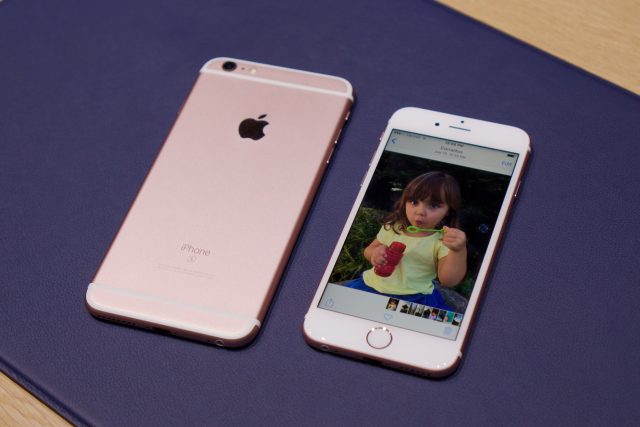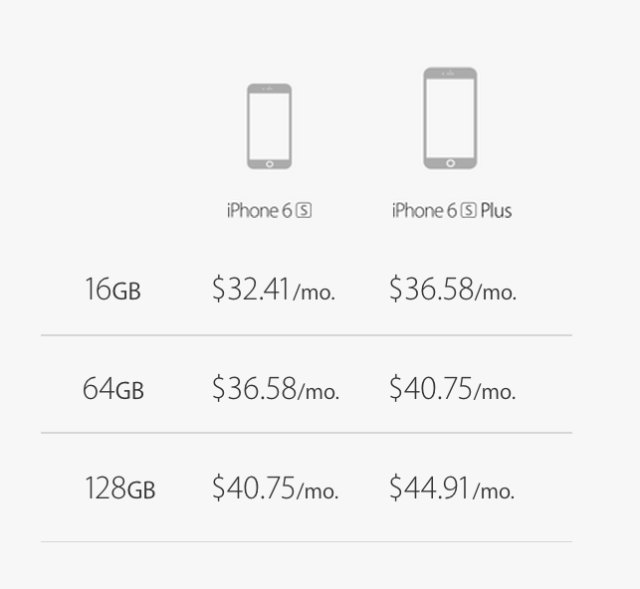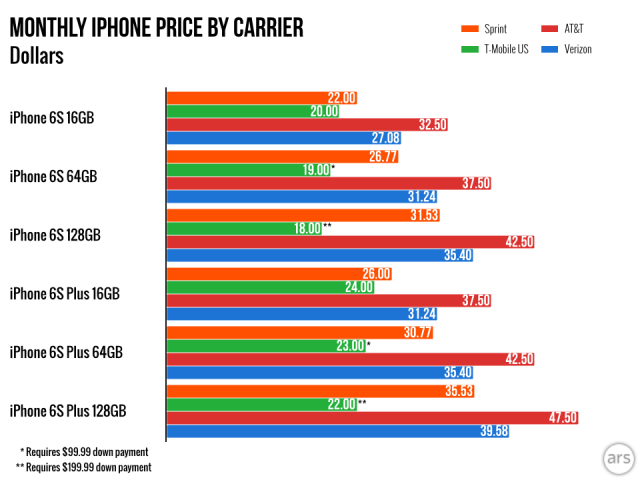
Apple is now selling iPhones on installment plans, giving customers the ability to pay a monthly charge for a phone and upgrade to a new one every year. The four major carriers in the US already offer phones on installment plans, but Apple's new "iPhone Upgrade Program" provides yet another option that might be better for certain customers.
Here are the basics: Instead of paying hundreds of dollars up front for a new iPhone 6S or 6S Plus, a customer gives Apple anywhere from $32.41 to $44.91 per month, depending on the model and storage amount. Such customers are eligible to upgrade to a new phone after making 12 months of payments.
So if you buy an iPhone 6S with 16GB of storage, the cheapest model, you'd pay $388.92 to essentially rent the phone over the course of a year, instead of $649 to own the phone outright. If you prefer keeping a phone for at least two years, it's cheaper to buy it outright.
The main benefit of the installment plan is the ability to upgrade to a new device every year—likely a hypothetical iPhone 7 about 12 months from now. The downside here is you have to trade in the year-old phone, which you could otherwise resell, use as a backup phone, or give to a family member or friend. Apple will presumably refurbish and resell the year-old phones, boosting revenue for what is already by far the company's biggest-selling product line.
The iPhone Upgrade Program does come with AppleCare+, which for the new iPhones would otherwise cost an additional $129 over two years. AppleCare+ provides extra technical support, two years of hardware protection instead of the standard one, and includes replacements for accidentally damaged devices up to two times for another fee of $99.
Apple said the financing program will be available "[e]xclusively at Apple’s retail stores in the US," so you can't actually order it online. When iPhones go on sale online at 12:01am PT this Saturday, customers who want Apple's financing will be able to make a reservation for a visit to an Apple store but won't be able to set up the finance deal without that store visit. The iPhone Upgrade Program requires a credit check, a credit card, and a 24-month installment loan.
If you go through the full 24 months without upgrading, you'll end up paying more than the cost of a phone on its own, but about the same amount that an iPhone and AppleCare+ costs together. You would also own the phone outright in this scenario, Apple told Ars. If you upgrade to a new device before the 24 months is up, you start a new 24-month cycle.
The announcement says a phone purchased with an installment plan must be activated on AT&T, Sprint, T-Mobile, or Verizon Wireless, but the phone purchased from Apple is unlocked and customers aren't required to sign a contract with the carrier. That means it's easier to switch carriers later.
Here's a look at the different financing options available through Apple:

(Correction: This post originally quoted a different price list from Apple's online ordering site, and has been updated with accurate pricing.)
If you buy an iPhone outright, the 6S costs $649 for 16GB, $749 for 64GB, and $849 for 128GB. The larger 6S Plus costs $749 for 16GB, $849 for 64GB, and $949 for 128GB.
Apple is also selling previous-generation iPhones on similar installment plans. The entry-level iPhone 6, for example, costs $27.45 per month on the annual upgrade program, or $549 to purchase it outright.
Carrier financing and early upgrades
One advantage of carrier upgrade programs is you're not locked into upgrading to the new iPhone. Instead, you can upgrade to the next great phone that catches your fancy regardless of which company makes it. On the other hand, going with a carrier's payment plan makes it harder to switch carriers later—though T-Mobile says it has a solution to that.
Let's take a look at what carriers are likely to charge for the new iPhones in their financing and early upgrade programs. T-Mobile today announced a new price scheme. The other carriers haven't announced new pricing since Apple's announcement yesterday, but iPhone prices generally don't change from generation to generation, so we can provide expected pricing with the caveat that carriers could switch things up. We've asked AT&T, Sprint, and Verizon if they intend to change prices and will update the story if necessary.
In the following chart, the Sprint, T-Mobile, and AT&T prices are what you'll pay each month for plans that let you upgrade phones after 12 months. The Verizon financing program doesn't allow upgrades before paying off the full cost of a phone, so the prices are what you'll pay each month over two years in order to eventually buy the phone outright.

Sprint and T-Mobile US appear to have the best deals for customers who want to upgrade after a year and don't mind trading in their old device, so let's take a look at them first.
Sprint
Sprint's recently announced "iPhone Forever" lease program lets customers pay as little as $22 a month and always get access to the latest iPhone, whenever it comes out.
Sprint is running a promotion with even lower prices if you trade in your existing phone, but in the above chart we're showing prices for when you buy into the program without trading in an old phone. Our expected price for Sprint's iPhone 6S Plus 128GB is an estimate as Sprint's website wasn't selling 128GB models of the Plus-sized iPhone this week.
Standard activation and upgrade fees apply on Sprint's lease plans.
T-Mobile US
T-Mobile's "Jump! On Demand" program, which is only available in retail stores, lets you trade in your phone for a new one up to three times a year.
For a limited time, T-Mobile is offering monthly lease prices lower than what's offered in Sprint's iPhone Forever program. But you have to put in a down payment of $99.99 or $199.99 to get an iPhone with more storage than 16GB, as noted in the chart. Once the limited time offer is up, all the monthly prices will increase by $7, so the entry-level cost of $20 will end up at $27. T-Mobile isn't saying when that will happen.
If you get the limited time offer and eventually pay off the full cost of the phone instead of upgrading early, you'll end up paying less than the device's full cost. After making 18 monthly payments, "you can hand back your phone and pay nothing more. Or you can pay just $164 more if you want to keep your iPhone 6s. That means your total cost to own your phone is just $524," T-Mobile said. That's for the entry-level model that typically costs $649.
T-Mobile also announced an incentive for people who want more flexibility to switch carriers. If you're not satisfied, T-Mobile will offer a refund for the first month of phone and service charges and unlock the phone so it can be used with a different carrier. You will lose the promotional pricing in this scenario. "For phones that get unlocked, we’ll let you keep our standard interest-free payment plan at our standard prices," T-Mobile said, adding that "The phones are universally compatible with all major US networks."
Apple says that it built multiple versions of the iPhone, as usual, because AT&T and T-Mobile rely on GSM cellular technology for voice while Sprint and Verizon use CDMA. All the iPhones can roam on GSM, though.
AT&T
AT&T's financing offers a few different options for monthly phone payments. "AT&T Next 12" lets you upgrade to a new phone in 12 months but spreads the cost of the phone into 20 monthly installments. If you trade in your phone for a newer one after 12 months, AT&T waives the unbilled monthly installments. But if you pay all 20 installments, the phone is yours to keep.
AT&T Next 18 divides the payments into 24 monthly installments but lets you upgrade after 18, while AT&T Next 24 divides the payments into 30 monthly installments but lets you trade in and upgrade after 24. There's also an option involving a 30 percent down payment.
You can upgrade before 12 months is up by paying a lump sum equal to the first 12 monthly payments. Upgrade fees do apply.
Verizon Wireless
Verizon's financing terms aren't for people who want to upgrade their phones early. Verizon used to let customers upgrade after paying off 50 percent of the cost of their phones, but the company changed it so that you now have to pay the full 100 percent. With Verizon, you're dividing the cost of the phone across 24 monthly payments, and then you can do with it as you wish.
Verizon does waive activation fees when you buy a phone with financing. Verizon also provides $15 and $25 discounts on the monthly line charge, which is generally $40 for smartphones.
After making 24 months of payments, customers can "recycle their old device for an account credit, donate it to Hopeline to help stop domestic violence, or give it to a friend or family member to activate," Verizon says.
Contracts aren't totally dead
Although traditional two-year wireless contracts are going out of style, it is still possible to buy phones on contract. In that case, entry-level iPhones cost $199 or $299 up-front, but contracts limit your flexibility to switch carriers, and ultimately you're paying for the cost of the phone anyway through inflated monthly service charges.
As previously noted, one of the benefits of Apple's upgrade program is getting an unlocked device that can be used on multiple carriers, without signing a contract with a wireless provider.
While the carriers have different policies for applying one-time fees, Apple's fine print notes that customers who buy phones directly from Apple may have to pay upgrade or activation fees charged by the carriers. Sorry.
This post has been edited to correct AppleCare+ pricing and clarify that the 24-month cost of Apple's financing program is similar to the cost of buying a phone and AppleCare+ together.
reader comments
171